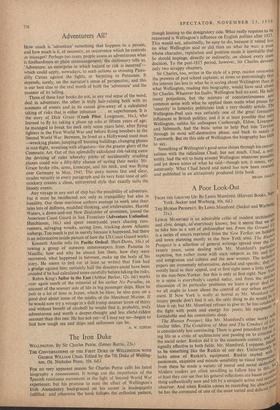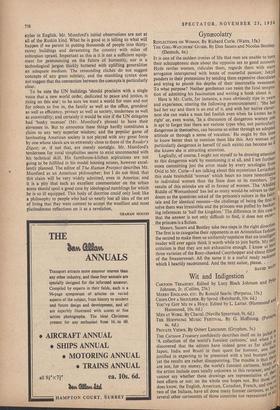A Poor Look-Out
LEWIS MUMFORD is an admirable critic of modern architecture and civic design, as everybody knows; but it seems that we °Lc to take him as a sort of philosopher too. From the Ground Uri, is a series of essays reprinted from the New Yorker, on bull''':1 and town planning mostly in the New York area. The 1110,"s't Prospect is a selection of general writings spread over the tr twenty years, some dealing with Mr. Mumford's particular expertise, but rather more with such subjects as life and loaf and integration and culture and the new woman. The techillco papers are immensely informative, detailed and specific: they ame mostly local in their appeal, and at first sight seem a little re,111"ri; to the non-New-Yorker; but this is only at first sight. New in a sense is everybody's capital today, and from the detaw-0 'discussion of its particular problems we learn a great deal, 111':0, we all ought to know about the control of our urban envr°,,i ment. If New York is really as horrid as Mr. Mumford 531'0 (many people don't find it so), the only thing to do would betel blow it up; but Mr. Mumford refuses to give in; he has condlW is the fight with point and energy for years; his equipment formidable and his convictions deep. ith The Human Prospect, like Mr. Mumford's other works similar titles, The Condition of Man and The Conduct of ,, is considerably less convincing. There is good precedent for 0 of ing life as a critic of architecture and passing on to criticism 5 the social order. Ruskin did it in the nineteenth century, andepncls signally effective in both fields. Mr. Mumford, I suppose, ill,' be to be something like the Ruskin of our day. Unfortunately a; some of Ruskin's equipment. Ruskin started wilas; passionate, exquisite and minute sensibility to visual impress0os. from these he made a variety 'of moral and social deduct Modern readers are often unwilling to follow him in this. n,• at least they can see that his general reflections are based on 5°.toive thing authentically seen and felt by a uniquely active and sens,lion5 observer. And when Ruskin comes to recording his observal..ose he has the command of one of the most varied and delicate P
styles in English. Mr. Mumford's initial observations are not at all of the Ruskin kind. What he is good at is telling us what will happen if we persist in putting thousands of people into thirty- storey buildings and devastating the country with miles of subtopian sprawl. Important as this is it is not a sufficient equip- ment for pronouncing on the future of humanity, nor is a technological jargon thickly buttered with uplifting generalities an adequate medium. The resounding clichés do not suggest concepts of any great subtlety, and the stumbling syntax does not suggest that the connection between the concepts is particularly clear.
To be sure the UN buildings 'should proclaim with a single voice that a new world order, dedicated to peace and justice, is rising on this site'; to be sure we want a world for men and not for robots to live in, the family as well as the office, grandeur as well as efficiency, privacy as well as society, tenderness as well as conviviality; and certainly it would be nice if the UN delegates had 'bosky recesses' (Mr. Mumford's phrase) to have their elevenses in. But to announce these things hardly constitutes a claim to any very superior wisdom; and the popular game of lambasting American society is not played with any great force by one whose ideals are so extremely close to those of the Reader's Digest; or, if not that, are merely nostalgic. Mr. Mumford's tenderness for rural simplicities seems to exist unconnected with his technical skill. His farmhouse-kitchen aspirations are not going to be fulfilled in his model housing estates, however excel- lently planned. The editor of The Human Prospect describes Mr. Mumford as an American philosopher; but I do not think that this claim will be very widely admitted, even in America; and it is a pity that such an excellent commentator on the urban scene should spoil a good case by ideological ramblings for which he is so ill equipped. This body of doctrine could only look like a philosophy to people who had so nearly lost all idea of the art of living that they were content to accept the woolliest and most platitudinous reflections on it as a revelation.
GRAHAM HOUGH











































































 Previous page
Previous page